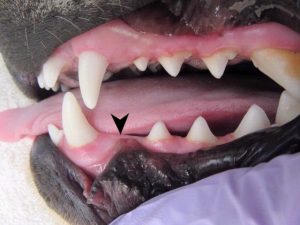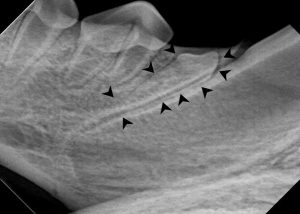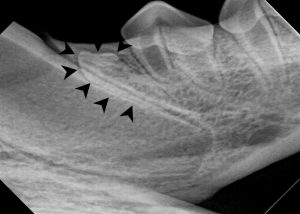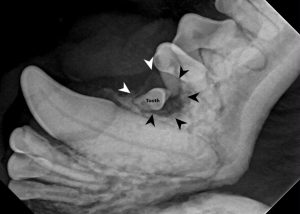
Puppies’ adult teeth start erupting at 3 months of age and are completely erupted by 6 months. Occasionally, this process can go wrong. This is why, it is extremely important for puppies to have a developmental exam by a veterinarian at 5-6 months of age. As we all know, puppies need a series of vaccines until 4 months of age. One of the areas that veterinarians examine prior to giving the vaccine is the puppy’s oral cavity. This is to ensure all teeth are healthy and there are no emerging issues. Puppy vaccines are finished by 4 months of age, but the puppy’s adult teeth are still erupting. At the developmental exam, your veterinarian will ensure your puppy’s adult teeth are erupting normally and in the right numbers. Adult dogs should have a total of 42 adult teeth; for reference adult humans have 32 teeth.
This brings us to our January Pet of the Month is Elvis. He is a very rambunctious Labrador puppy that has non-stop energy! You can imagine doing a thorough oral exam can be a challenge. During Elvis’s developmental exam it was found that he was missing two teeth on each side of his lower jaw.
When there is a missing adult tooth there are two things that can happen.
-
-
-
- There is no adult tooth. In this case, nothing further is needed and there are no long-term issues.
-
-
- There is an adult tooth hidden under the gingiva. In this case we must intervene.
The only way to know if there is an unerupted adult tooth is by doing a dental radiograph under anesthesia.
As you can see from Elvis’s radiographs his missing teeth are present and hidden under the gingiva. These teeth are buried under the bone of the mandible and have no chance of erupting normally. If we leave these teeth buried there is a chance, they will form a dentigerous cyst.
Dentigerous cysts are cysts that are formed around unerupted teeth. These are NOT cancerous but are locally invasive and if left untreated can result in jaw fractures. The good news is that these cysts typically take a long time to develop (months to years). This means if we find the missing tooth and remove it, no cyst will form.
Elvis had oral surgery to remove both of his buried teeth. He recovered well from the surgery and now there is no risk for dentigerous cyst formation.

 6512 12th Ave NE
6512 12th Ave NE








